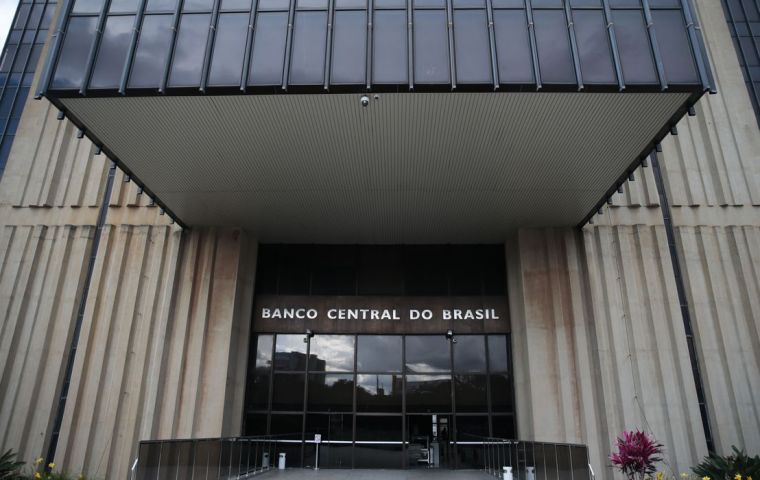MercoPress. South Atlantic News Agency
Brazil central bank keeps rate unchanged despite Lula's government complaints, “the highest in the world”
 “The Committee emphasizes that it will persist until the disinflationary process consolidates and inflation expectations anchor around its targets”
“The Committee emphasizes that it will persist until the disinflationary process consolidates and inflation expectations anchor around its targets” The Brazilian Central kept interest rates unchanged for the fifth consecutive policy meeting on Wednesday, increasing concern and criticism from the government of president Lula da Silva. The bank's rate-setting committee, Copom, maintained its Selic benchmark interest rate at 13.75%. The decision, which defied intense pressure from the government of Lula da Silva, matched the expectations of analysts.
“Taking into account the uncertainty of the scenarios, the committee, Copom, remains vigilant, assessing if the strategy of maintaining the Selic rate for a long period will be enough to ensure the convergence of inflation,” policymakers wrote in their policy statement.
“The Committee emphasizes that it will persist until the disinflationary process consolidates and inflation expectations anchor around its targets, which have shown additional deterioration, especially at longer horizons,” they added.
Finance Minister Fernando Haddad criticized the statement, saying it was “very concerning,” and the central bank's next decision could put the country's fiscal position “at risk.”
“Copom even signals the possibility of an increase in the interest rate, which is already the highest in the world today,” Haddad told reporters, in reference to policymakers' insistence that they would not hesitate to resume hikes if disinflation did not happen as expected.
Haddad also said Brazil's inflation is more controlled than that of other developing countries, and that inflation expectations could rapidly be reduced in light of new events.
David Beker, head of Strategy for Latin America at Bank of America, said in a note to clients he still sees the easing cycle beginning in May, but with “higher risks of a delay, given the tone of the statement.”
Several economists expected the central bank to mention challenges to the global economy, which could potentially create space for rate cuts to begin earlier than previously anticipated, after high-profile U.S. bank closures and the Credit Suisse rescue.
The central bank acknowledged the worsening global environment amid banking turmoil, but emphasized recent data on global activity and inflation have remained resilient.
The bank also noted the process of monetary policy tightening in major economies continued to advance, following the Federal Reserve's decision to continue to raise U.S. interest rates.
Inflation in Brazil has cooled to 5.6% in the 12 months through February, but it is still far above this year's 3.25% official target. Meanwhile, the central bank's inflation expectations have risen to 5.8% for 2023 and 3.6% for 2024. Next year, the target is 3%.
Lula has repeatedly called for lower borrowing costs, describing the current Selic rate “irresponsible”. In a sample of the criticisms that will follow, his chief of staff, Rui Costa, said late on Wednesday that the policy decision “only increases unemployment and the suffering of the Brazilian people.”




Top Comments
Disclaimer & comment rules-

Read all commentsSeems to me, a modest amount invested in a Brazilian savings account (poupança) could be a hedge against the deteriorating currency. ( https://www1.folha.uol.com.br/mercado/2023/03/saiba-quanto-rendem-r-1000-na-poupanca-cdb-e-tesouro-com-a-selic-a-1375.shtml ) This obviously does not aid poor people who do not have such funds to set aside, but middle class and better households can benefit. Once again, this highlights the inherent problems for a society with such severe income disparity and a large underclass living hand to mouth.
Mar 23rd, 2023 - 03:04 pm 0Commenting for this story is now closed.
If you have a Facebook account, become a fan and comment on our Facebook Page!